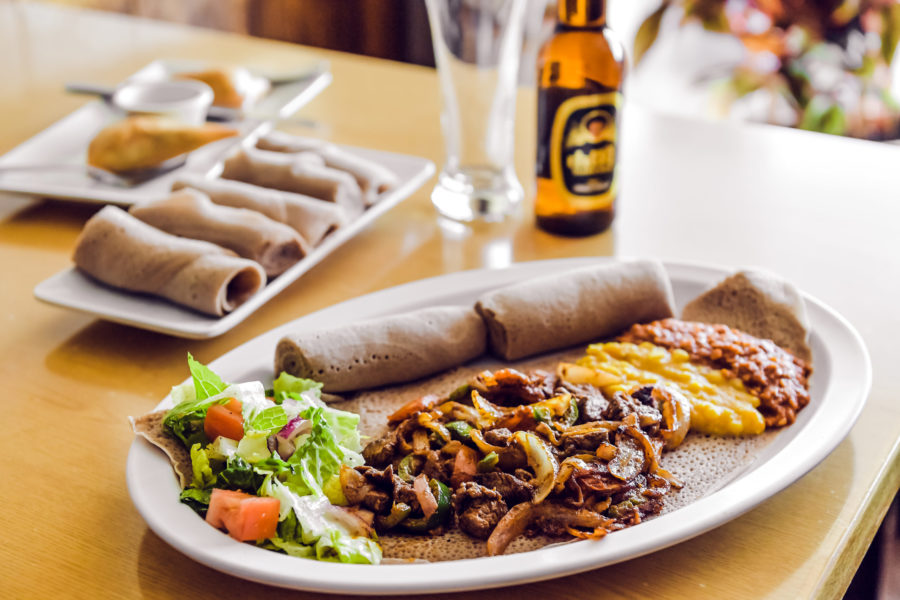
Photo by David Stuck
Upon entering Sheba Ethiopian Restaurant in Rockville, one is immediately whisked 7,000 miles away by the smell of spices to Ethiopia’s capital city of Addis Ababa.
Mehari Kebede has owned the intimate cafe for four years, and is always excited to introduce his native Ethiopia’s cuisine to his diners in Montgomery County. Although Montgomery County is home to one of the largest Ethiopian communities in the United States, Kebede said about 80% of his customers are from somewhere other than the East African nation.
Nothing at Sheba is pre-cooked, he said. “Everything is freshly cut, especially our vegetarian and vegan samplers, which are the top sellers.”
Spices such as turmeric, jalapeno peppers and garlic, are brought in directly from Ethiopia every few months, providing customers with the most authentic version of whichever dish they choose.
The vegetarian sampler comes with egg wot—a spicy type of stew—spicy red lentils, Ethiopian collard greens, ater kik alicha—which is a split pea stew—and cabbage. The beef sampler comes with tibs—which is a hybrid of stirfry and stew—as well as a beef stew and rice.
Both samplers come with a side of injera bread, which is among the most iconic dishes from Ethiopia. This spongy bread takes two to three days to make, and uses flour made from teff, a plant native to Ethiopia and Eritrea. The injera bread can be used in lieu of utensils to pick up bites of the meal. The combination of the bread and the sauce that is picked up from the stew gives the injera its distinct sour flavor.
Kebede recommended the kitfo and tibs, the former of which consists of minced raw beef, marinated in mitmita—a chili powder-based spice blend —and niter kibbeh—a clarified butter infused with herbs and spices. The kitfo can be eaten raw, Kebede said.
Kebede said his passion for cooking was planted in him by his mother at a very young age. “She used to put me in the kitchen and teach me how to cook,” Kebede said. “The passion started from there. And when I came to America 30 years ago, I started working as a dishwasher in a restaurant. I said, ‘this must be my way.’
Now he owns Sheba, providing authentic Ethiopian food and experiences for his customers. Patrons can request an Ethiopian coffee ceremony, in which Kebede or another employee roasts, grinds and boils the coffee—much of the ritual is done in front of the customer. As Ethiopian music plays, Kebede lights incense and pours the coffee from handmade clay pots into small cups with a side of popcorn.
“We try to provide quality service for our customers, with God as our witness,” Kebede said. “I cannot say we are perfect. But from our heart, we really try to do our best to satisfy our customers.”
Sheba customers are rarely one-time patrons. Some come in several times a week.
“Without them, we can’t stay in business,” Kebede said. “So we make sure they always get the quality service that they deserve.”
Sheba could have gone out of business during the height of the pandemic, Kebede said. In the midst of a major business slowdown, one of Sheba’s regular customers came in and asked Kebede how the restaurant was doing. After Kebede told him they were struggling, the customer went home and got a group of friends together through social media to support the restaurant. After that, Kebede said, “business was flooded.”
“That shows you how we are related to the community here.”
Sheba Ethiopian Restaurant
5071 Nicholson Lane, Rockville
301-881-8882
ordershebarockville.com




